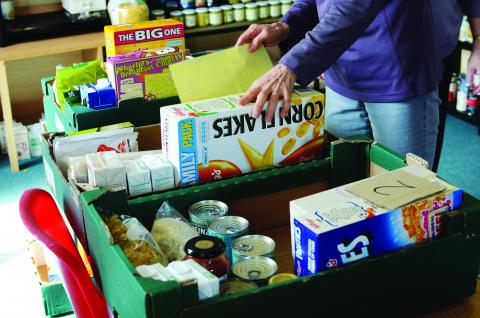20 September 2023
Food Prices Tracker: September 2023

By Josh Day
Food inflation falls to 13.6% according to government data
Data released today from the Office of National Statistics finds that overall inflation has fallen for the third consecutive month, dropping to 6.7% (CPI) in the 12 months to August 2023. This is partly due to food inflation continuing to ease, falling to 13.6% (CPIH). High food inflation has been a major contributor to to rising overall inflation and recent decrease have played a large part in inflation slowing.
The Basic Basket
However, despite food inflation falling, a weekly food shop remains unaffordable for many. The Food Foundation’s Basic Basket is a shopping basket tracker to measure weekly price changes in what the average man and woman could typically eat as part of a reasonably costed, adequately nutritious diet (see FAQs for further details). We have been tracking the cost of the Basic Basket since April 2022. Since then, the woman’s basket of food has increased in price by 23.9%, now costing £50.76 per week. The male basket has increased by 27.5% (non-clubcard price) and currently costs £55.49 per week.
The impact of climate change on food prices
A recent study from The Stockholm Resilience Center at Stockholm University found that six out of nine planetary boundaries are being crossed, showing a planet which is in increasing danger of “irreversible change and harm”. The food system is a major contributor to climate change with a third of all human-caused greenhouse gas emissions linked to food. For the health of our planet and the nation the impact of our food system on the environment must be addressed.
Not only does the food system impact on climate change, but climate change also impacts on our food system. Extreme weather is becoming more common, driving rises in the number of droughts, wildfires and floods that occur across the world, all of which can have huge impacts on food production.
With around half of the food eaten in the UK is imported from overseas. more extreme weather driven by climate change could threaten food security in the UK by leading to food shortages and price rises, according to a report by the Energy and Climate Intelligence Unit (ECIU). In particular, the ECIU highlights that of the 49% of food imported into the UK from abroad, 25% is imported from the Mediterranean. The Mediterranean has experienced some of the worst heat extremes ever in recent years, leading to widespread drought and wildfires which have in turn impacted on harvests. Some of the commodities imported from the Mediterranean that could be at risk of shortages or price rises include onions, peppers, tomatoes, and broccoli.
With more frequent extreme and unpredictable weather here in the UK, it isn’t just the UK’s imported foods that could be at risk. A report by the Climate Coalition says that more frequent hot weather and record-breaking rainfall in the UK, poses a threat to British grown fruits and vegetables. The report states that British grown produce could become increasingly scarce, with more than half of UK farms saying they have been affected by severe climatic events in the last 10 years. Price rises of these foods in the UK could make it even more difficult for those already struggling to afford a healthy and nutritious diet.
Pasta is another UK staple that could see price increases due to adverse weather. The production of durum wheat in Canada, has fallen by as much as 20% according to experts. This has been due to increased amounts of hot and dry weather, driven by climate change. Canada is the largest global exporter of durum wheat and as harvests continue to be impacted, global wheat prices could increase, risking more expensive products on super market shelves.
What needs to happen?
As extreme weather due to climate change continues to impact global food supplies, our food system could come under more severe and regular pressure, leading to shortages and price increases. When prices increase, it is often people living on lower incomes who are impacted the most as they need to spend a greater percentage of their income on food.
The risks of climate change need to be mitigated to prevent negative impacts on our food security. However, it is not a case of individual responsibility, instead systemic change is needed to ensure that damaging human impacts on the planet are reduced. Our government must recognise the need to shift our food system and our diets to more sustainable foods by increasing the affordability, availability, and appeal of more sustainable foods, allowing everyone to eat in a way that is better for them and better for the earth.

Josh joined The Food Foundation in 2023 as part of the Rank Foundation’s Time to Shine scheme. He completed a BA in Film Studies before continuing to study an MA in Culture and Critical Theory. Before moving to The Food Foundation Josh worked in a variety of roles in a primary school setting, utilising his experience to support the most vulnerable and disadvantaged members of the school community. Josh is interested in the impact that food systems and environments have on people's lives and is driven by a desire to ensure people have better access to a healthy and nutritious diet.

Shona joined The Food Foundation as a Project Officer in 2019 and has worked on research, policy and advocacy across a range of projects over that time including leading our food insecurity surveys and flagship annual Broken Plate reports. She now works across the charity's policy portfolio including our children's food campaigns, food insecurity and food environments. She is a Registered Associate Nutritionist with a background in clinical nutrition who worked in dietetic departments in NHS hospitals before joining The Food Foundation.

Indu joined The Food Foundation in 2019 as part of the Rank Foundation’s Time to Shine scheme, moving into a Project Officer role in 2020. She works on the Peas Please and Plating up Progress projects. Prior to joining The Food Foundation, Indu completed a MSc in Public Health and a BSc in Human Nutrition. She is interested in reducing health inequalities, children’s health and wellbeing, and sustainable and nutritious food system/diets. Indu is also a lover of veg, having recently taken up urban gardening.





